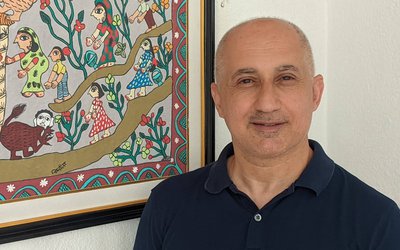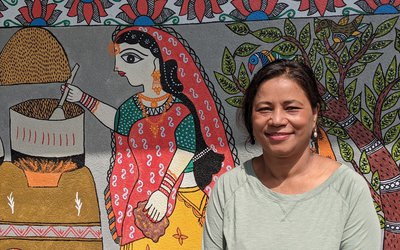
Having worked in Nepal back in 2010 as a program officer in the peace building process, Michael Shipler, Regional Director, Asia, Search for Common Ground, a U.S. based INGO, remembers the fragile situation of Nepal when he was transferred. Recently visiting Kathmandu, SHIPLER spoke to New SPOTLIGHT on various issues. Excerpts:
Since you were here when Nepal was in the early phase of peace building process, how do you view the situation now?
When I was transferred to the U.S. the situation was still fragile in Nepal. This time when I paid a visit to Nepal, I found the situation is quite normal as Nepal is holding the local elections. Peace process is very painful and difficult. Despite such complications, Nepal has made a good progress. Following the signing of Comprehensive Peace Agreement, Nepal held two elections for Constituent Assembly. The country has already promulgated a new inclusive constitution through the elected Constituent Assembly. Integration of Maoist combatants was another important step. Having said that, what Nepal needs now is to make progress in transitional justice. You cannot say whether it is five years or seven years to bring the process into logical consequences.
How do you see the Transitional Justice system?
Every society has to grasp its history and memory of the past. If the society grapples through the issue of human rights violations, there is the need to allow the the process to evolve. One cannot impose it from outside. From outside, they can impose standards of accountability and standards of human rights. It should not be imposed entirely from the outside as you have very strong human rights groups and institutions here. Some countries are much late. Sri Lanka started a mechanism of transitional justice system eight years after the end of war. In Combodia, the transitional justice mechanism started to work only thirty years after the end of Khameruj. Despite certain shortcomings, it is good to see the formation of two committees including Disappearance Committee and Truth and Reconciliation Committee. There was more space and openness to talk about what happened during the war. Still, the political environment does not seem to be conducive to really account and record what occurred like true revelation of fate of disappearance or repression of victims of the war. Personally, what I can see is Nepal can still move in the right way to achieve long lasting peace delivering justice to the victims of conflict. No society has the ability to bury its history as the history can wake up to the cracks.
What is Search for Common Ground’s priority in Nepal now? How do you see the level of governance now?
Laugh. Having lived just four years in Nepal, I just have enough knowledge to predict wrong. I often told the people that what I said might be wrong. However, most of the people say what I predicted came true. The governance challenges unfolded following the completion of elections and constitution of elected institution. Given enormous amount of goodwill at the local level, among the people, the youth leaders, women leaders and human rights activists, that will be really a huge exercise to transform the society. The collaboration between the local governance and people in service delivery will be a real challenge. It will be very difficult as well to understand the demands of local people, particularly the marginalized groups. The collaboration between newly elected leaders of local bodies and local population is very important to build efficient governance mechanism responsive to improve the delivery system. The collaboration between the civil servants, public and elected representatives is key for the local governance. This is a very wonderful time for Nepal’s political process and governance process.
What are the areas of focus?
This is the eleventh year in Nepal. We do a long term commitment in a country where we work. Our role exactly will be fostering collaboration between the civil service, bureaucrats and elected representatives in the new scenario. We perceive in our approach to bring all the sectors as we believe in a common ground approach. Our approach will be to build a common ground for government, society and elected representatives to work together no matter where they sit. As an international INGO, our job is to work with our counterparts and others to foster, collaborate in governance and education sectors. That is the essence of our purpose and that is one of the goals. In the last ten years, we were in peace building, bringing the different stakeholders, working with citizen groups, working across the country, to make the peace process successful. Now, we can support the full implementation of constitution and federalism. As an organization having experiences of working around the world with local governance and around all different kinds of conflicts, we can plan important role in community empowerment.
After the completion of elections, Nepal’s main challenge is now for governance. What role will your organization play?
Election is key to the peace process. After the completion of the elections, Nepal’s transition will come to an end. The question is whether all the new dynamics lead to prosperous, stable and peaceful Nepal. The challenge is how to work within all these dynamics. That will define peace, it is not all about violence prevention only. It is about building the institutions where collaboration will be the norm. There will be adversarial conflicts in the elections politics. It is also important to defuse tension. We are now looking around all the institutions which we have been collaborating with. We are also looking at the social norms which is about what is the attitude about class, caste, religion, ethnicity, political identity and parties. How can we work with media and other sectors so that social norms drive other sectors like politics and people who are divided towards each other. To drive to convergence with each other. We definitely intend to work with media. Now we are working with radio stations, particularly around security and justice and marginalized. We want to continue work with tele serials. Our tele serial Singha Durbar is a blockbuster. Singha Durbar serial had done nicely in our terms and we are working on for Singha Durbar II. We intend to work in societal level and traditional level.
How do you take the emergence of social media?
Social media is bringing the change. It will provide you more access with more media. Social media provides more outlets but it is also narrowing the views. It is accessing information rather than truth in the global levels. Ten years ago the situation was different. You have access to all kinds of news and opinions. Now, you have more information but you cannot guarantee whether they are true at all. In the next ten years, all people will have similar access. This time social media cannot find discourse in elections. Next elections will be totally saved by the online discourse.
- TANAHU HYDROPOWER PROEJCT: A Significant Achievement
- Apr 15, 2024
- AMBASSADOR HANAN GODAR: Sharing Pain With A Nepali Family
- Mar 30, 2024
- VISIT OF KfW AND EIB TO NEPAL : Mission Matters
- Mar 25, 2024
- NEPAL BRITAIN SOCIETY: Pratima Pande's Leadership
- Mar 24, 2024
- NEPAL ARMY DAY: Time To Recall Glory
- Mar 15, 2024
















